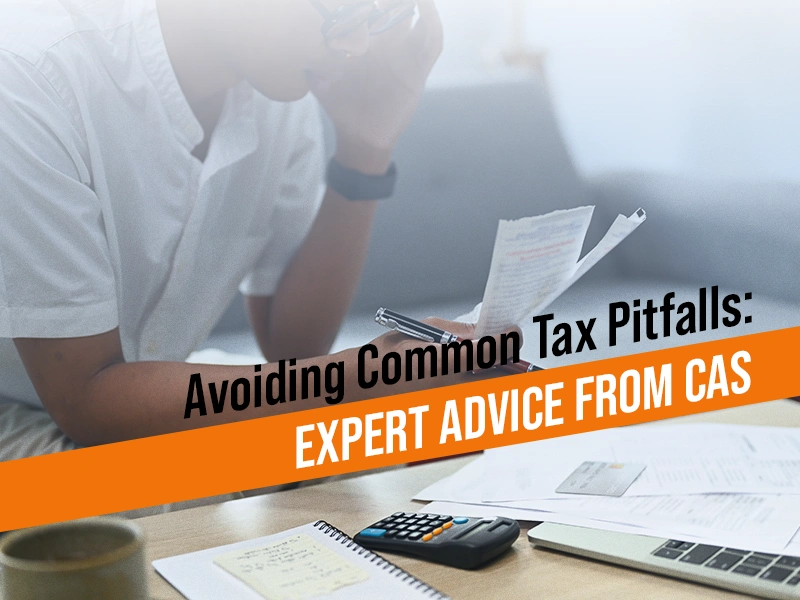
Tax season can be a daunting prospect for taxpayers across the board. Even if you are extremely diligent in paying your tax dues, you could find yourself inadvertently caught in the tax regulations web, which could result in costly penalties and stress. All this worry and nerve-wracking can be averted with the help of an expert from the finance world or a tax professional. A tax professional helps you navigate the complex IRS regulations with proper tax planning in CA that ensures you save on taxes in the long run while also attaining your financial goals. In this blog, we get a tax professional's perspective on common tax pitfalls and how to stay protected.
Common Tax Pitfalls
1. Ignoring the benefits of income deferral
Income deferral is an extremely powerful tool used by tax professionals to help taxpayers shift their earnings to future years when they might be in a lower tax bracket, thereby reducing their current tax liability. Failing to utilize these provisions can result in paying higher taxes than necessary, diminishing the potential for long-term financial growth and stability.
2. Failing to strategize with capital gains and losses
Tax professionals view this failure on the part of investors as a missed opportunity for optimizing tax liability. By not planning, taxpayers often end up with higher tax bills, as they fail to utilize tax-loss harvesting techniques to offset gains with losses. Proper strategizing with a tax professional can help in timing the sale of investments to coincide with periods of lower tax brackets and efficiently carry over losses to reduce taxable income in future years.
3. Ignorance about tax-advantaged investments
Tax-advantaged investments like Roth IRAs, 401(k) plans, and Health Savings Accounts (HSAs) offer substantial tax benefits that can enhance long-term financial security. Without understanding these tools, taxpayers might overpay taxes, lose out on compound growth benefits, and fail to maximize their retirement savings. A tax professional can ensure you take full advantage of the tax benefits available and efficiently grow your wealth.
4. Failing to optimize business expenses
As a business owner, you need to meticulously track and manage your expenses to avoid missing out on valuable deductions and paying higher taxes. Such oversight can also result in inefficient resource allocation, affecting your overall profitability. Tax professionals advise leveraging tax deductions for expenses such as office supplies, travel, and professional services and reinvesting those savings in growth initiatives.
5. Disregarding entity structure optimization
Your choice of business entity type—be it a sole proprietorship, partnership, limited liability company (LLC), or corporation—affects the taxation, liability, and operational flexibility of your company. Failing to select the most advantageous structure can result in higher tax burdens, less favorable legal protections, and potential difficulties in raising capital or transferring ownership. Consulting with a tax professional before choosing your entity type will ensure your business structure aligns with your specific business goals and financial circumstances, ensuring optimal growth and tax efficiency.
6. Failing to adhere to compliance standards and risk management practices
Non-compliance with regulations, even due to ignorance, can result in hefty fines, legal penalties, and even the suspension of your business operations. Furthermore, inadequate risk management can lead to unforeseen challenges and crises, causing debilitating business disruptions and losses. Enlist the help of a tax professional to help identify potential risks, implement robust controls, and ensure ongoing adherence to regulatory requirements, safeguarding the long-term stability and success of your organization.
7. Overlooking Tax credits and incentives
Tax credits, such as the Earned Income Tax Credit (EITC) or the Child Tax Credit, directly reduce the amount of tax owed, which could result in substantial savings. Similarly, business incentives, like the Research and Development (R&D) Tax Credit, can significantly lower operational costs. Missing out on these benefits means you pay more in taxes than necessary. Staying informed about available credits and incentives with the help of your tax professional will help optimize your tax strategy and enhance your financial well-being.
8. Not Planning for Retirement
Overlooking retirement planning when crafting tax-saving strategies can have significant long-term consequences. Contributions to retirement accounts like 401(k)s and IRAs not only provide you with a nest egg for the future but also offer immediate tax advantages by reducing your taxable income. Failing to maximize these opportunities means missing out on both potential tax deductions now and the compounded growth of investments over time. Discuss with your tax professional about integrating retirement planning with your tax strategies for your present and future financial well-being.
9. Neglecting estate planning
Without a proper estate plan, your assets may not be distributed according to your wishes, potentially causing disputes among heirs and even costly legal battles. Additionally, you could miss out on opportunities to minimize estate taxes and other expenses, reducing the overall value of your estate. Proper estate planning with a tax professional ensures that your assets are managed and transferred efficiently, provides for the care of minor children, and protects beneficiaries' interests.
10. Overlooking splitting the tax burden
You should be informed about splitting your tax burden to reduce your high personal and business tax liabilities. Strategies like income splitting between spouses or shifting income to family members in lower tax brackets can bring in potential tax savings. Otherwise, you could end up paying more taxes than required, reducing your disposable income and overall financial efficiency. You can do the same for your business by spreading out income across different entities or subsidiaries to optimize tax outcomes. Consult with a tax professional to implement effective tax burden-splitting strategies.
11. Ignorance about deductions and tax credits
Tax professionals cite clients' ignorance about deductions and tax credits as a reason for poor personal and business financial health. Many taxpayers miss out on valuable opportunities to reduce their tax liability simply because they are unaware of the deductions and credits for which they are eligible. Deductions like mortgage interest, student loan interest, and medical expenses, along with tax credits such as the Earned Income Tax Credit (EITC) and Child Tax Credit, can substantially lower your tax burden. Identify and apply all available deductions and credits to ensure a more favorable tax outcome.
12. Failing to employ charity in tax saving
Donating to charity often provides tax deductions, thus reducing your taxable income and overall tax liability. This means you can potentially keep more of your hard-earned money while supporting causes that matter to you. Get the maximum from your charitable donations by consulting a tax professional and aligning your donations with your tax-saving strategies.
Tax planning doesn't have to be a source of anxiety with the help and support of a tax professional. Shield yourself from the common tax pitfalls by staying informed and employing various tax-saving provisions to protect your finances and lower your tax liability. Investing time and resources in proper tax planning can bring in significant savings in the long run.
FINLOTAX: YOUR DEPENDABLE TAX CONSULTANCY FIRM IN CA
At FinloTax, we provide comprehensive financial planning assistance to help you strategize and take advantage of various tax-saving avenues. Get the expertise of a tax professional when you team up with us and sidestep costly pitfalls. We will tailor strategies that maximize your tax savings and guide you through every step of the process. Don't let inaccurate tax decisions jeopardize your financial goals. Just call 4088229406 and talk to the experts at FinloTax!

